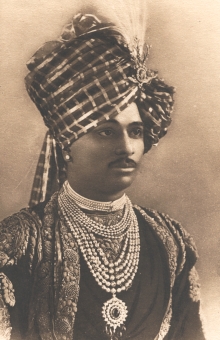Thakur (title)

Thakur Lakhajirajsinhji II Bavajirajsinhji of Rajkot
Thakur or Thakkar is a historical feudal title of India, now used as a surname. The female variant of the title is Thakurani or Thakurain, also used to describe the wife of a Thakur.
The word Thakur means 'lord', 'god' or 'master'.[1][2] The title was used by rulers of several princely states including Ambliara, Vala, Morbi and Barsoda. Sons of Thakurs were given the Sanskrit title of Kumara ('prince'), popular usage being Kunwar in the North and Kumar in Bengal and South India.[3][4]
In the zamindari system, Thakurs were landlords who used to collect revenue in their feudatory estate.[citation needed]
A Thakur's estate was called a Thakurate or Thikana,[5] and was recognised at a salute state rank in the British Empire of India. The Thakore Sahib of Dhrol,[6]Thakur Sahib of Limbdi,[7]Thakur Sahib of Palitana and Thakur Sahib of Rajkot[8] were recognised with hereditary 9-gun salutes, while the Thakur Sahib of Gondal received an 11-gun salute.
Contents
1 Etymology
2 Princely states ruled by Thakurs
2.1 Thakurs
2.2 Compound variants
3 Thikana
4 See also
5 References
6 External links and sources
Etymology
It is derived from the Sanskrit word thākura meaning deity, idol, chief or man of rank.[9][10]
Princely states ruled by Thakurs
Thakurs
Thakur served as the title of many historical states,[11] including: Beja State, Bija State, Chuda State, Dhadi State, Kachhi Baroda State, Kathiwada State, Kawarda State, Khirasra State, Kunihar State, Mahlog State, Mohanpur State, Ranasan State, Sanjeli State, Sayla State, Vallabhpur State, Valasna State, Wadagam State.
In some states, the Thakur's title was later changed, notably:
- to Raja in Kharsawan.
- to Rai in Sangri State.
- to first Raja and later Maharaja in Maihar State.
- to (once) Maharawat, then Rao in Piploda State.
In Tharoch State, the ruler's title of Rana was changed to Thakur, before being reverted to Rana again later.
Compound variants
The title had loftier compound variants, notably:[12]
Thakur Sahib, as in
- all salute states ruled by Thakurs : Dhrol State, Limbdi State, Palitana State (all Hereditary salutes of 9-guns); other salute states later recognized by a higher salute assumed the title of:
Maharaja in Bhavnagar State (Hereditary salutes of 13-guns, 15-guns local), and Gondal State (Hereditary salute of 11-guns)
Maharana in Wadhwan State (Hereditary salute of 9-guns).
- non-salute states Bhadrawa State, Jambughoda State, Lakhtar State, Lathi State, Rajkot State, Vallabhipura State; later assumed a higher rank, notably:
Rana in Balsan State
Raja in Baraundha Pathar Kachhar State; and see below
- all salute states ruled by Thakurs : Dhrol State, Limbdi State, Palitana State (all Hereditary salutes of 9-guns); other salute states later recognized by a higher salute assumed the title of:
Thakur Sahib Maharaja, assumed instead of Thakur Sahib by the last ruler of Morvi State.
Thakur Shri Maan, notably in Ambliara State.
Thikana
Thikana is the fief or princely state ruled by the thakurs.
See also
- Sardar
- Mankari
Thakuri, Nepalese royal title
Thakore caste
Babu Saheb, title of Rajputs in Bihar. Used interchangeably with Thakur.- Thakur (Bengali surname)
Dharma Thakur, a Hindu folk deity worshipped in the Rarh region
References
^ Yule, Henry (1903). "Hobson-Jobson: A glossary of colloquial Anglo-Indian words and phrases". London: J. Murray..mw-parser-output cite.citation{font-style:inherit}.mw-parser-output q{quotes:"""""""'""'"}.mw-parser-output code.cs1-code{color:inherit;background:inherit;border:inherit;padding:inherit}.mw-parser-output .cs1-lock-free a{background:url("//upload.wikimedia.org/wikipedia/commons/thumb/6/65/Lock-green.svg/9px-Lock-green.svg.png")no-repeat;background-position:right .1em center}.mw-parser-output .cs1-lock-limited a,.mw-parser-output .cs1-lock-registration a{background:url("//upload.wikimedia.org/wikipedia/commons/thumb/d/d6/Lock-gray-alt-2.svg/9px-Lock-gray-alt-2.svg.png")no-repeat;background-position:right .1em center}.mw-parser-output .cs1-lock-subscription a{background:url("//upload.wikimedia.org/wikipedia/commons/thumb/a/aa/Lock-red-alt-2.svg/9px-Lock-red-alt-2.svg.png")no-repeat;background-position:right .1em center}.mw-parser-output .cs1-subscription,.mw-parser-output .cs1-registration{color:#555}.mw-parser-output .cs1-subscription span,.mw-parser-output .cs1-registration span{border-bottom:1px dotted;cursor:help}.mw-parser-output .cs1-hidden-error{display:none;font-size:100%}.mw-parser-output .cs1-visible-error{font-size:100%}.mw-parser-output .cs1-subscription,.mw-parser-output .cs1-registration,.mw-parser-output .cs1-format{font-size:95%}.mw-parser-output .cs1-kern-left,.mw-parser-output .cs1-kern-wl-left{padding-left:0.2em}.mw-parser-output .cs1-kern-right,.mw-parser-output .cs1-kern-wl-right{padding-right:0.2em}, Page 915
^ "Thakur Name Meaning". Ancestry.co.uk. Retrieved 2016-11-12.
^ Vadivelu, A. The Aristocracy of Southern India, Volume 2.
^ https://indiankanoon.org/doc/1159456/
^ "Agarsingji Raisingji vs Bai Naniba on 9 April, 1914". Indian Kanoon. Retrieved 2016-11-12.
^ Wright, Colin. "DHROL: Jai Singh, Thakur Sahib of Dhrole (1824-1886)". British Library. Retrieved 2016-11-12.
^ Rathore, Abhinay. "Limbdi (Princely State)". Rajput Provinces of India. Retrieved 2016-11-12.
^ Strathcarron, Ian (2013-07-24). The Indian Equator: Mark Twain's India Revisited. Courier Corporation. ISBN 9780486315805.
^ "Sanskrit Dictionary for Spoken Sanskrit". SpokenSanskit.org. Klaus Glashoff. Retrieved 2013-09-21.
^ "Thakur". Every Culture. Retrieved 2016-11-12.
^ "www.worldstatesmen.org". Princely States of India (here K-Z). Retrieved 2016-12-12.
^ "www.worldstatesmen.org". Princely States of India (here A-J). Retrieved 2016-12-12.
External links and sources
- WorldStatesmen - India - princely states; here: K-Z
- RoyalArk - India - here: Salute States